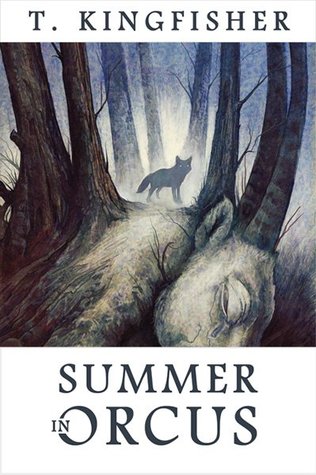 There aren't many books like that, and Ursula Vernon (who is T. Kingfisher when she's writing less easily categorizable books) has written quite a few of them now. The T. Kingfisher stories are often fairy tale retellings, or stories that sound like they could be folk tales. Summer in Orcus is a portal fantasy, but it starts out with Baba Yaga's hut appearing in Summer's back alleyway, so the folk-tale roots are deep and resonant. (And, much like Every Heart a Doorway, but in a different way, Vernon is re-writing the paradigm of the portal fantasy.)
There aren't many books like that, and Ursula Vernon (who is T. Kingfisher when she's writing less easily categorizable books) has written quite a few of them now. The T. Kingfisher stories are often fairy tale retellings, or stories that sound like they could be folk tales. Summer in Orcus is a portal fantasy, but it starts out with Baba Yaga's hut appearing in Summer's back alleyway, so the folk-tale roots are deep and resonant. (And, much like Every Heart a Doorway, but in a different way, Vernon is re-writing the paradigm of the portal fantasy.)Summer in Orcus might start out seeming like a middle-grade book, but it gets darker and deeper as it goes on, and it's just not quite written like a middle-grade book. (Vernon explains why in her very interesting afterword. She was going for a more realistic depiction of what would happen if a 12-year-old was sent into a fantasy world on a quest.) A very sophisticated younger reader could handle it. A reader who understands who Baba Yaga is, and why Summer should be quite afraid of her but can probably trust her. At least, in certain particular instances. (Antelope women, however, are not to be trusted.)
So original, so vividly imagined. I don't want to spoil any of the surprises; some of her ideas made me laugh out loud, they were so weird and funny and yet, perfect. I keep wanting to use that word, because even though this story seems a hodge-podge of crazy fantasy ideas, everything works together into a cohesive, perfect whole. It reminds me of A Face Like Glass, by Frances Hardinge, which is also full of crazy imaginative ideas, but none of them are throwaway; they all end up being important, somehow. Writers who have that kind of vision are really impressive. Also, writers with the knack for humour as truth-telling are infinitely rare and valuable. (She's up there with Terry Pratchett.)
And Summer is a wonderful heroine; incredibly realistic and sympathetic. She's not a hero, but she chooses her path and keeps going even when she really, really wants to go home. She has the weaknesses and strengths of a 12-year-old who might be a little wiser than her years, but doesn't quite know it yet. “It would be a good day for the world if I could not find a child who knew terrible adult things. But I will be a great deal older before that day comes, I think.”
I stayed up late to finish this, and then couldn't sleep, it moved me so strongly. Ursula Vernon is a well-known and acclaimed author, but more people need to discover what she's doing when she's T. Kingfisher.
Creamy chorizo pasta (saute onions and peppers and sliced cured chorizo, add spinach or kale, chopped tomatoes or a bit of tomato paste, pour in cream, serve over a substantial pasta shape like rotini). Delicious comfort food with bite.
Thanks for telling me about this book. It really does sound wonderful. I do love fairy tale retellings or books that sound like them. And thanks for the recipe at the end. Sounds good!
ReplyDeleteOoh... this sounds lovely! I'm adding it to my want-to-read list.
ReplyDeleteI don't know what she's doing under either name, which I know is terrible! I'm sure I will love her under either name but I keep forgettinggggggggg. And then when I remember, her books are all checked out at the library.
ReplyDeleteYou can read many of her short stories for free online at tkingfisher.com
Delete